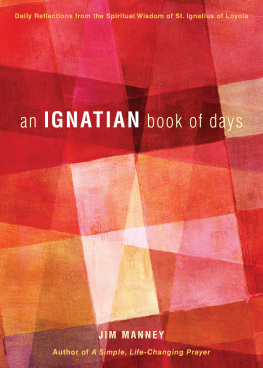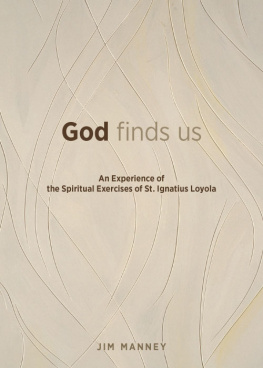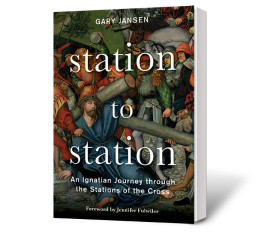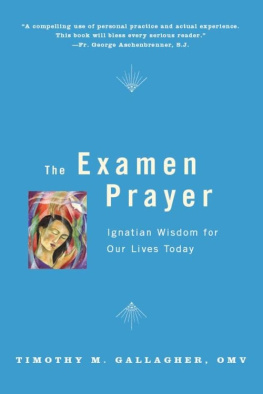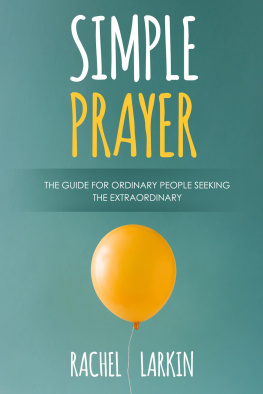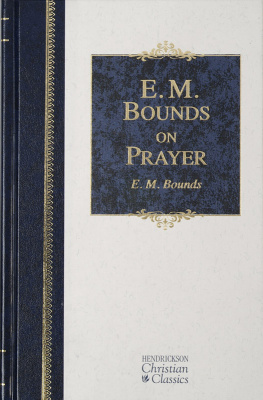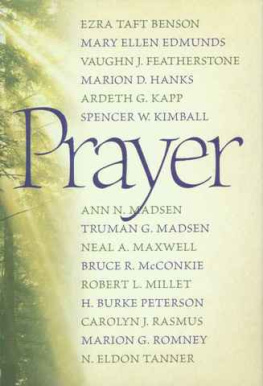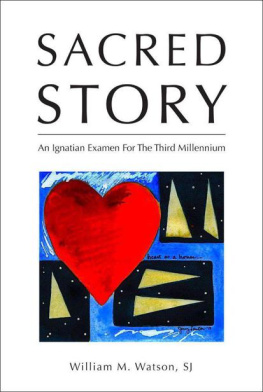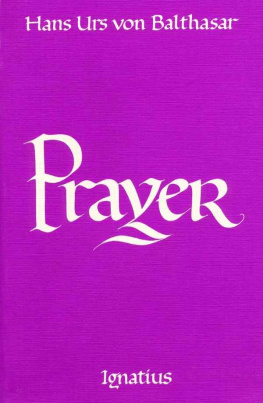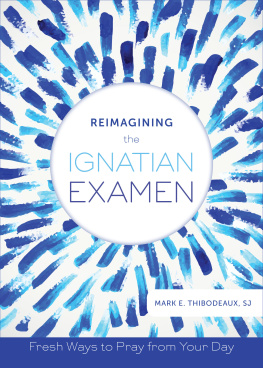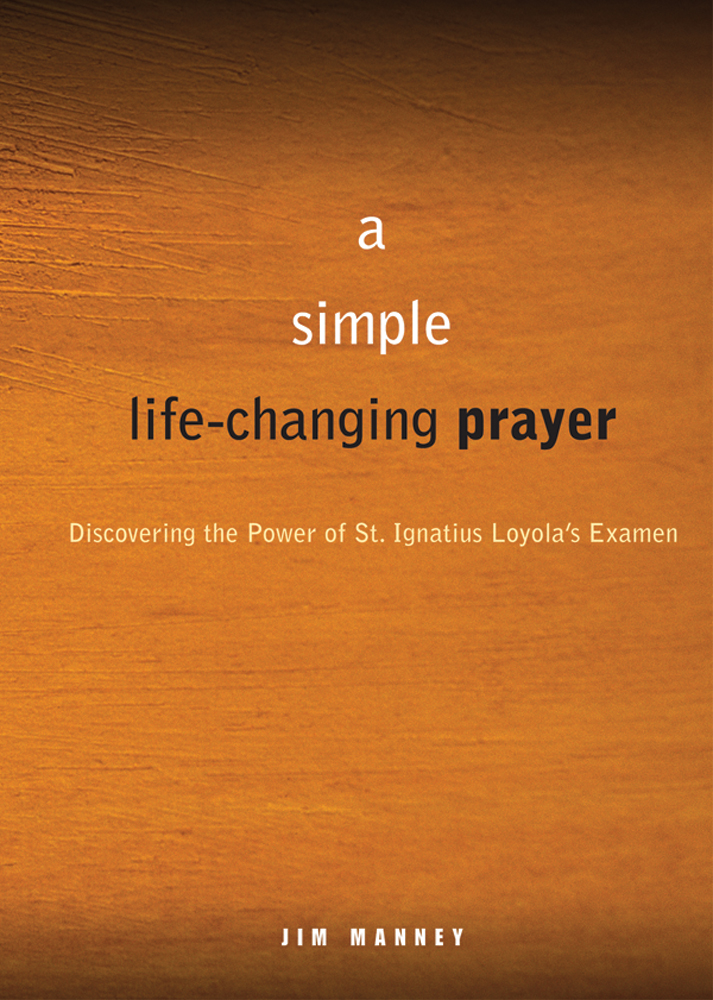
A
Simple,
Life-Changing Prayer
Discovering the Power of St. Ignatius Loyolas Examen
JIM MANNEY


www.loyolapress.com
2011 Loyola Press
All rights reserved
Quotes from The Spiritual Exercises are from The Spiritual Exercises of St. Ignatius , translated by Louis J. Puhl (Chicago: Loyola Press, 1951). Used by permission.
Scripture excerpts are from the New American Bible with Revised New Testament and Psalms Copyright 1991, 1986, 1970 Confraternity of Christian Doctrine, Inc., Washington, DC. Used with permission. All rights reserved. No portion of the New American Bible may be reprinted without permission in writing from the copyright holder.
Cover image: PhotoAlto/Frederic Cirou/Getty Images
Library of Congress Cataloging-in-Publication Data
Manney, Jim.
A simple, life-changing prayer : discovering the power of St. Ignatius Loyola's Examen / Jim Manney.
p. cm.
ISBN-13: 978-0-8294-3535-1
ISBN-10: 0-8294-3535-2
1. Ignatius, of Loyola, Saint, 14911556. Exercitia spiritualia. 2. PrayerCatholic Church. 3. Spiritual lifeCatholic Church. I. Title.
BX2179.L8M327 2011
248.3--dc22
2010044933
First ePub edition, December 2010. Current ePUB version 2.0, May 2011.
ePub ISBN: 978-0-8294-3562-7
Contents
The examen changed everything for me, but that almost didnt happen. For years I had occasionally heard people talk about the examen as a good way to pray. I went to a Jesuit college; I remember one of my teachers saying that St. Ignatius of Loyola himself thought that the examen was the indispensible prayer. But I wasnt interested because I thought they were talking about the Examination of Conscience.
The Examination of Conscience was the methodical inventory of sins that I was taught to do as a boy in Catholic schools of the 1960s. I would work my way through lists of faults, toting up my offenses in preparation for the sacrament of confession. This was a grim exercise, also a confusing one. I understood lying, and eventually I knew what lust was. But what was acedia? (It means spiritual laziness.) At any rate, the charm of the Examination of Conscience wore off as I grew older. I set it aside and moved on to other things, not all of them improvements. When people talked about the examen, this is what I thought they meant, and I wasnt interested. I thought it was just the thing for people who like that kind of thing, but I wasnt one of them.
Then I learned that the Ignatian examen was not the old, depressing Examination of Conscience. Quite the opposite. This was a prayer that focused on Gods presence in the real world. It looked to a God who was near to me, present in my world, and active in my life. It told me to approach prayer with gratitude, not guilt. It helped me find God in my life as I lived it, not in some heavenly realm beyond space and time. The examen had me take myself seriously, as I was, not as I wished I was or thought I could be someday if I worked hard enough.
Its no exaggeration to say that the examen changed everything. It might change things for you too.
I dont know exactly what a prayer is.
I do know how to pay attention.
Mary Oliver, The Summer Day
The examen is a method of reviewing your day in the presence of God. Its actually an attitude more than a method, a time set aside for thankful reflection on where God is in your everyday life. It has five steps, which most people take more or less in order, and it usually takes 15 to 20 minutes per day. Here it is in a nutshell:
1. Ask God for light.
I want to look at my day with Gods eyes, not merely my own.
2. Give thanks.
The day I have just lived is a gift from God. Be grateful for it.
3. Review the day.
I carefully look back on the day just completed, being guided by the Holy Spirit.
4. Face your shortcomings.
I face up to what is wrongin my life and in me.
5. Look toward the day to come.
I ask where I need God in the day to come.
Simple? Yes. Easy? Not really. Sometimes praying the examen is smooth and joyful; sometimes its arduous. If the examen prayer is doing its job, it will bring up painful moments and cause you to look at behavior thats embarrassing. Sometimes you squirm praying the examen, but why would you have it otherwise? Real prayer is about change, and change is never easy.
But theres nothing complicated or mysterious about making the examen part of your life. The subject matter of the examen is your lifespecifically the day you have just lived through. The examen looks for signs of Gods presence in the events of the day: lunch with a friend, a walk in the park, a kind word from a colleague, a challenge met, a duty discharged. The examen likes the humdrum. God is present in transcendent spiritual moments, but hes also there when you cook dinner, write a memo, answer email, and run errands. The examen looks at your conscious experience. The ebb and flow of your moods and feelings are full of spiritual meaning. Nothing is so trivial that its meaningless. What do you think about while sitting in traffic or waiting in a long line at the grocery store? Whats your frame of mind while doing boring and repetitive chores? Youll be surprised at how significant such moments can be when you really look at them.
The examen surprised me because it was so unlike prayer as I had previously understood it. Prayer for me was a time set apart. With the examen the boundaries between prayer and life became blurred. People usually pray the daily examen at a set time (for me usually in the morning), but theres no reason why we cant pray the examen while standing in that long line at the grocery store. After all, God is there too.
But in another way the examen didnt surprise me at all. God is certainly there while youre standing in line. All you need to pray the examen is a little quiet time. This made intuitive sense. I am Gods creature living in Gods world; of course God would be present in my everyday experience. If prayer is making a connection with God, it makes perfect sense to spend some time finding God in my conscious experience of daily life.
In fact, the examen is a very old practice. The word examen comes from a Latin word that means both an examination and the act of weighing or judging something. Its as old as Socratess instruction to know thyself. A practice of regular self-scrutiny is found in most religions of the world, and this is certainly the case with Christianity. To follow the path of Jesus, we must regularly scrutinize our behavior and ask how closely our actions conform to Christs.
Five hundred years ago, St. Ignatius of Loyola made an innovative twist on this ancient tradition of prayerful reflection. He made it a way to experience God as well as to assess our behavior. Ignatiuss famous book The Spiritual Exercises is a guide to an intense experience of conversion to the cause of Christ. He designed the daily examen to sustain and extend this experience. Ignatius wanted to help people develop a reflective habit of mind that is constantly attuned to Gods presence and responsive to Gods leading. The examen became the foundation for this graced awareness. Ignatius wanted Jesuits to practice the examen twice a dayat noon and before sleep. He considered it so important that he insisted that Jesuits pray the examen even when they were too busy to pray in other ways.
Next page

